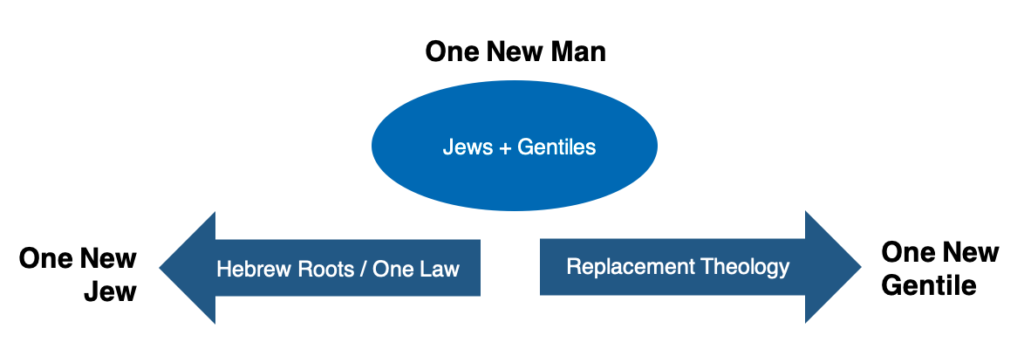I have been the director of Messianic Jewish Studies at The King’s University (TKU) since 2015, and I get the sense from my little corner of the universe that the Church is at a crossroads in understanding its relationship to Jews and Judaism. I keep meeting pastors and worship leaders and other devoted Christians who want to wade into these deep waters but find it difficult to know which directions are healthy and which lead to weirdness.
The aim of this article is to call us to work toward realizing Paul’s Ephesians 2 vision of the One New Man, made up of Jews and Gentiles in Messiah, who affirm each other as Jews and Gentiles. This is a healthy direction, and it leads to much partnership, fruitfulness, and peace in the kingdom of God. I also want to show how Hebrew Roots/One Law Theology and Replacement Theology represent departures from Paul’s One New Man vision—in opposite directions—with the former resulting in the One New Jew and the latter in the One New Gentile.

The King’s University Experience
From its beginning in 1997, The King’s University has been a trailblazer in its mission “to love, affirm, and stand with the Jewish people and Israel.” As a result, today we have a Center for Israel and Jewish Studies, a Messianic Jewish Studies program (undergraduate through doctoral level), a master’s degree with a concentration in Antisemitism and Jewish Advocacy, Land of the Bible concentrations, and a faculty, staff, and student body made up of Gentile Christians and Jewish believers. What makes The King’s University all the more fascinating is that this Jewish presence and focus is not something that runs parallel to the rest of the university; rather, Messianic Jews and Messianic Jewish studies are fully integrated into the life of the community even as Jews and Gentiles at TKU affirm each other in their respective identities and callings. Our Statement on the Church and the Jewish People puts it this way:
“We believe that the Church is a body of Jews and Gentiles in Messiah who are called to live out a God-given relationship of interdependence and mutual blessing (Rom 11:11-25; 15:7-27). At The King’s University, we celebrate this unity in diversity. Gentile believers do not need to become Jews or take on Jewish lifestyle to walk in the ways of the Lord (Acts 15). However, Jewish followers of Jesus are called to remain true to their identity as Jews (1 Cor 7:17-24; Acts 21:17-26).”
Given the centuries old parting of the ways between the Church and the synagogue, it is a miracle that we have a Christian university in our day where the faculty, staff, and student body is made up of Messiah-confessing Jews and Gentiles, who identify as Jews and Gentiles, and there is shalom bayit (peace in the house). As one who has participated in this learning community since 2015, I can testify that it is the real deal. Consider also that Jew-Gentile partnership is where the Church is heading. History is going in the direction of healing the schism between the Church and the Jewish people, and God forming his One New Man described in Ephesians 2. The King’s University is modeling something of eschatological importance (John 17:20-23), and we sense the leading of the Spirit and the goodness of the Lord in pioneering this Ephesians 2 approach to unity in the Church.
Continue reading “One New Man, Hebrew Roots, Replacement Theology.”
Did This Article Interest You?
If exploring the Jewish roots of Yeshua’s life, ministry, and future return captured your attention, you’ll love diving deeper through The King’s University’s Messianic Jewish Studies (MJS) program. Our fully accredited program equips students to bridge the Church and the Jewish people, training leaders as rabbis, teachers, and advocates.
Whether you’re inspired to uncover more about the biblical context of the end times or develop a deeper understanding of God’s covenant with Israel, the MJS program offers bachelor’s, master’s, and doctoral degrees tailored to your calling.
Learn more and start your journey at The King’s University.


